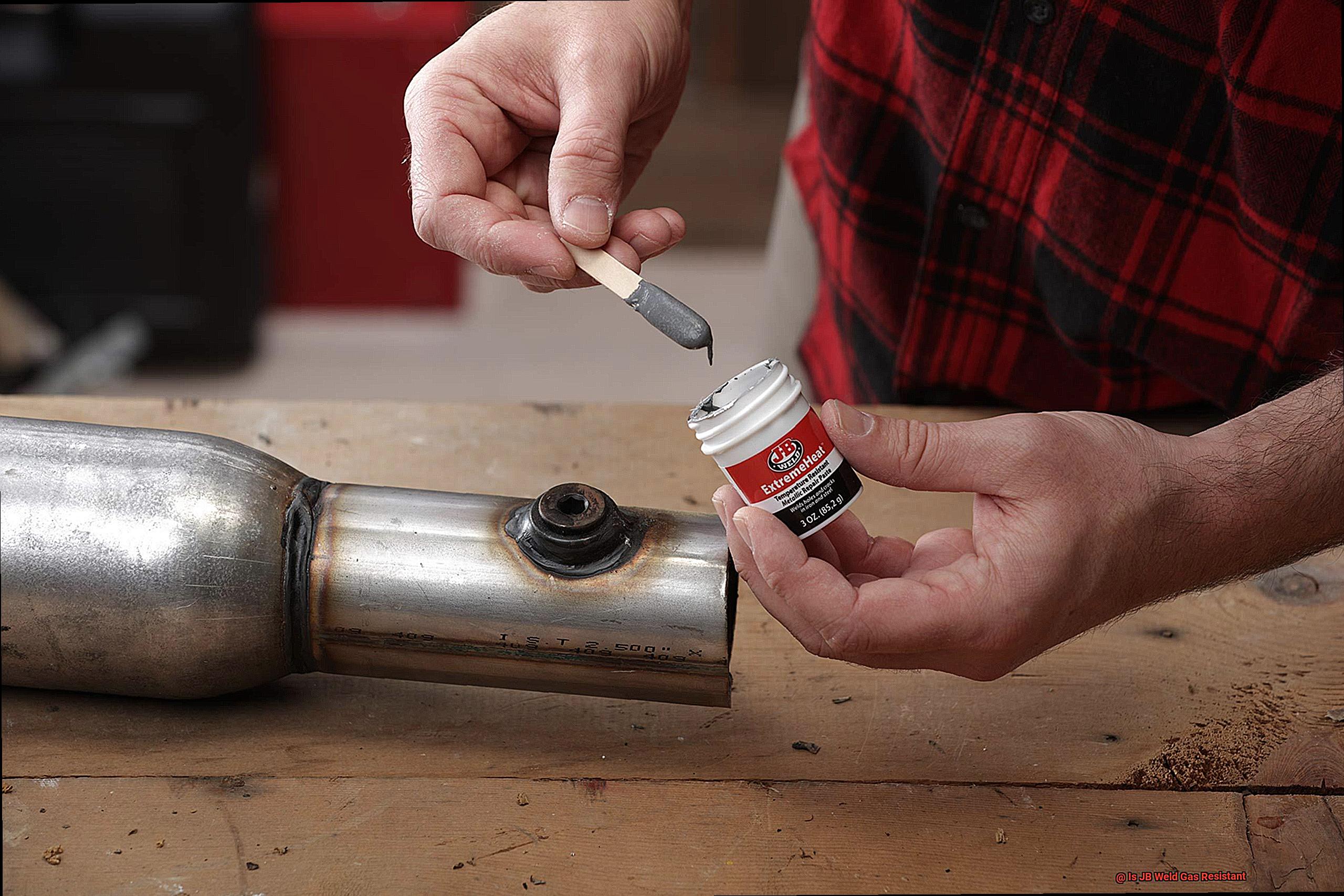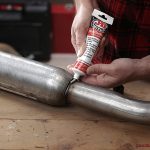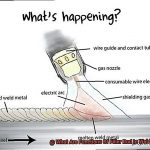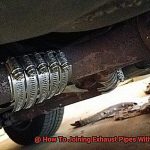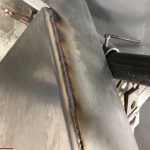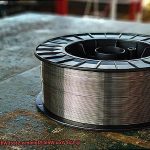Are you in a fix and need to repair your vehicle’s gas tank or fix a gas line in your home? If so, then you must be wondering if JB Weld is the right adhesive for the job. JB Weld is a go-to epoxy adhesive that is popular for its industrial-strength bonding capabilities. It can be used for various repairs, from fixing leaks to creating structural bonds. But when it comes to gas resistance, things are not as simple as they seem.
In this blog post, we’ll delve into the question of whether JB Weld is gas resistant. We’ll explore what gas resistance means and the types of gases that JB Weld can withstand. Additionally, we’ll cover the conditions under which it can be used safely and provide tips on how to use it for gas-related repairs. Moreover, we’ll highlight some alternatives if JB Weld isn’t the best option.
So, if you’re looking for reliable information on whether JB Weld is suitable for your gas-related repair needs, you’ve come to the right place. This post will equip you with all the necessary information to make an informed decision.
What is JB Weld?
Contents
If you’re tired of constantly replacing components that are exposed to harsh environments and high temperatures, it’s time to discover the ultimate solution – JB Weld. This popular brand of epoxy adhesive is renowned for its exceptional strength and durability. It’s the go-to choice for automotive and industrial applications to repair cracks, leaks, and other types of damage.
What sets JB Weld apart from its competitors is its remarkable gas-resistance. Its unique formula – a mixture of two-part epoxy resin and hardener – creates a chemical reaction that produces a strong and durable bond. This bond not only resists gas but also water, chemicals, and heat.
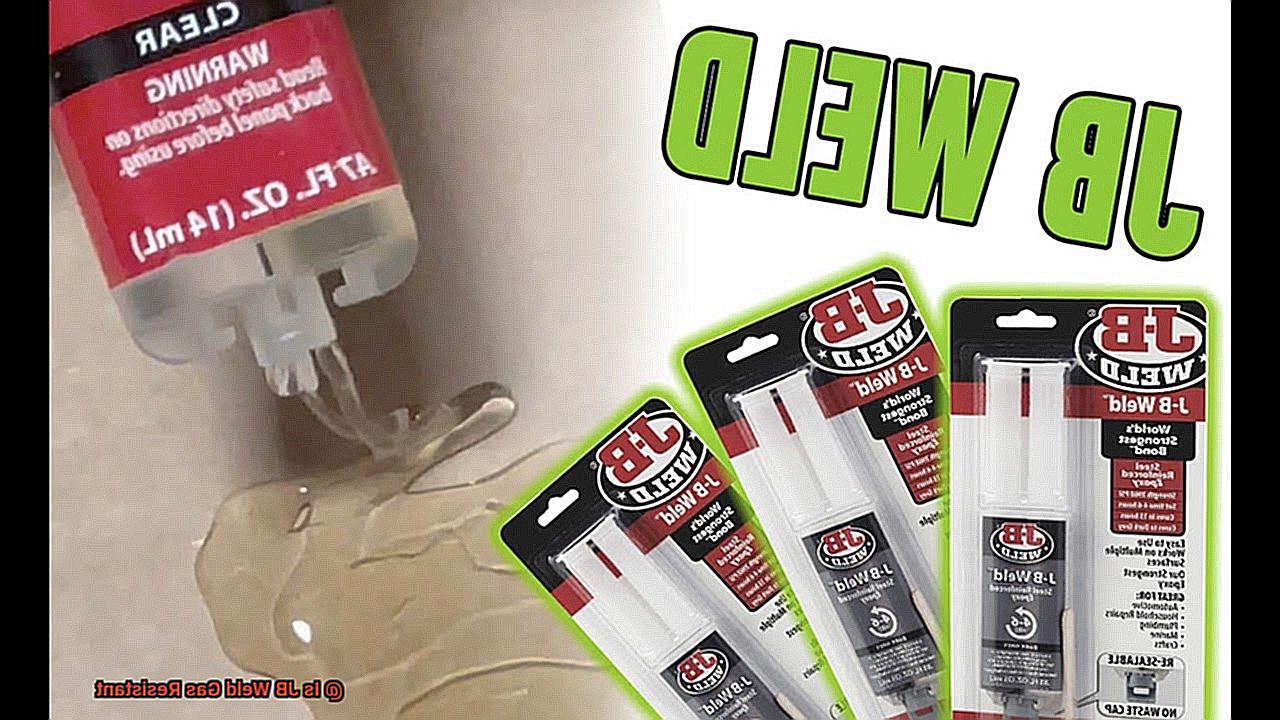
But how does JB Weld achieve this impressive feat? The secret lies in the careful attention given to each component of the formula. The resin and hardener are expertly blended to produce a mixture that can be used on a variety of surfaces, including metal, wood, plastic, ceramic, and more. What’s more, it can withstand exposure to gasoline, diesel fuel, propane, and natural gas.
The JB Weld Company was founded in 1969 and is based in Georgia, USA. The product was originally developed for use in the aerospace industry but has since become one of the most versatile and reliable adhesives available on the market. Professionals and DIY enthusiasts alike have come to rely on JB Weld for all kinds of repairs.
Using JB Weld for gas-related repairs or applications is simple but requires careful attention to detail. Properly cleaning and preparing the surfaces to be bonded is crucial. Once this is done, mix the epoxy thoroughly, apply it evenly, and allow it to cure for the recommended time.
JB Weld comes in various formulations to suit different repair needs. There’s even a high-temperature variant that can withstand temperatures up to 500 degrees Fahrenheit. This makes it ideal for use on exhaust systems and other hot surfaces.
Is JB Weld Gas Resistant?
Look no further than JB Weld, the ultimate solution for repairing components that demand durability and strength. But before you dive into using JB Weld, it’s crucial to know whether it’s gas resistant or not.
The good news is that JB Weld is indeed gas resistant. The manufacturer claims that this product can withstand temperatures of up to 550 degrees Fahrenheit and exposure to different types of fuels, including gasoline, diesel fuel, propane, and natural gas. This makes JB Weld a popular choice for repairing gas tanks, exhaust systems, and other automotive parts.
However, it’s essential to note that JB Weld may not be suitable for all types of gas exposure. Methanol or other alcohol-based fuels can weaken the bond over time, which is why it’s crucial to follow the manufacturer’s instructions carefully when using JB Weld. Proper application and curing are necessary to ensure that it can withstand exposure to gas or other chemicals.
In conclusion, if you’re looking for an epoxy adhesive that can withstand exposure to gas and other fuels, JB Weld is an excellent choice. With its exceptional strength and durability, you can rest easy knowing that your repairs will last for years to come.
Reasons Why JB Weld is Gas-Resistant
JB Weld: The Ultimate Gas-Resistant Adhesive Solution
When it comes to industrial and automotive applications, using an adhesive that can withstand harsh environments is crucial. JB Weld is a popular choice because of its impressive gas-resistant properties. But what exactly makes JB Weld stand out from other adhesives? Let’s dive into the details.
Chemical Composition
The chemical composition of JB Weld is one of the main reasons it’s so effective at resisting gases. When the two parts of the adhesive, resin and hardener, are mixed together, they create a chemical bond that can withstand extreme temperatures and pressure. This bond is incredibly strong and durable, making it highly resistant to gases like gasoline, diesel fuel, propane, and natural gas.
Curing Time
JB Weld has an impressive curing time of 15-24 hours. During this time, the adhesive bonds with the metal surface and creates a strong seal that is resistant to gas leaks. This is crucial in preventing dangerous gas leaks in high-pressure systems like fuel lines and hydraulic systems. Unlike other adhesives that may require additional time or heat to cure properly, JB Weld can be trusted to provide a secure bond that lasts.
Heat Resistance
Another factor that contributes to JB Weld’s gas-resistance is its ability to withstand high temperatures. With a temperature resistance of up to 550°F (287°C), JB Weld is ideal for use in high-heat applications like exhaust systems. This ensures that even in the hottest environments, JB Weld won’t break down or lose its integrity.
Pressure Resistance
High-pressure environments can be challenging for some adhesives, but not for JB Weld. One of its standout features is its ability to withstand high pressure, which is crucial in preventing gas leaks in pressurized systems like fuel lines and hydraulic systems. You can trust that JB Weld will provide a secure seal even in the most demanding pressure environments.
Tensile Strength and Low Coefficient of Thermal Expansion
JB Weld’s high tensile strength and low coefficient of thermal expansion also play a crucial role in its gas-resistant properties. Its ability to maintain its integrity even when subjected to stress or changes in temperature makes it an excellent choice for industrial settings where exposure to harsh chemicals and other corrosive substances is common.
This ensures that even in the most challenging environments, JB Weld can be trusted to provide a strong and durable solution.
How to Use JB Weld for Gas-Related Repairs
Gas-related repairs can be daunting, but with the right tools and techniques, you can quickly fix any issues that arise. JB Weld is a popular epoxy that is specifically designed to repair a wide range of materials, including gas-related components. In this blog post, we’ll cover five subtopics to explain how to use JB Weld correctly for gas-related repairs.
Gas Resistance
One of the most critical considerations when using JB Weld for gas-related repairs is its resistance to gasoline and other types of fuel. Fortunately, JB Weld is specially formulated to resist exposure to a wide range of chemicals, including gasoline, diesel fuel, propane, natural gas, and oil. This means that it can reliably repair components that come into contact with these substances.
Surface Preparation
Before using JB Weld for gas-related repairs, it’s vital to prepare the surface properly. This includes thoroughly cleaning the area and ensuring that it’s entirely dry before applying the JB Weld. Moreover, it’s recommended to roughen the surface with sandpaper or a wire brush for better adhesion.
High Temperatures
JB Weld is designed to withstand high temperatures, making it an excellent choice for repairing exhaust systems and other components exposed to heat. However, it’s essential to allow the epoxy to cure for at least 24 hours before exposing it to gas or other potentially hazardous conditions. This ensures that the bond is strong and durable.
Proper Application
Applying JB Weld in thin layers and allowing each layer to dry before adding additional layers is crucial. This ensures that the bond is strong and durable. Over-applying JB Weld can compromise its strength, so ensure that you apply it in thin layers.
Appropriate Repairs
Although JB Weld can be an effective solution for many gas-related repairs, it may not be suitable for all types of repairs. For example, it may not be appropriate for repairing gasoline tanks or other high-pressure gas systems. In these instances, consult a professional or use a specialized product designed specifically for those types of repairs.
Advantages of Using JB Weld for Gas-Related Repairs
If you’re in the market for a dependable and resilient solution for your gas-related repairs, look no further than JB Weld. This brand is well-known and trusted in the world of welding and repairs, making it a go-to choice for many professionals and DIY enthusiasts. In this article, we’ll delve into the advantages of using JB Weld for gas-related repairs.
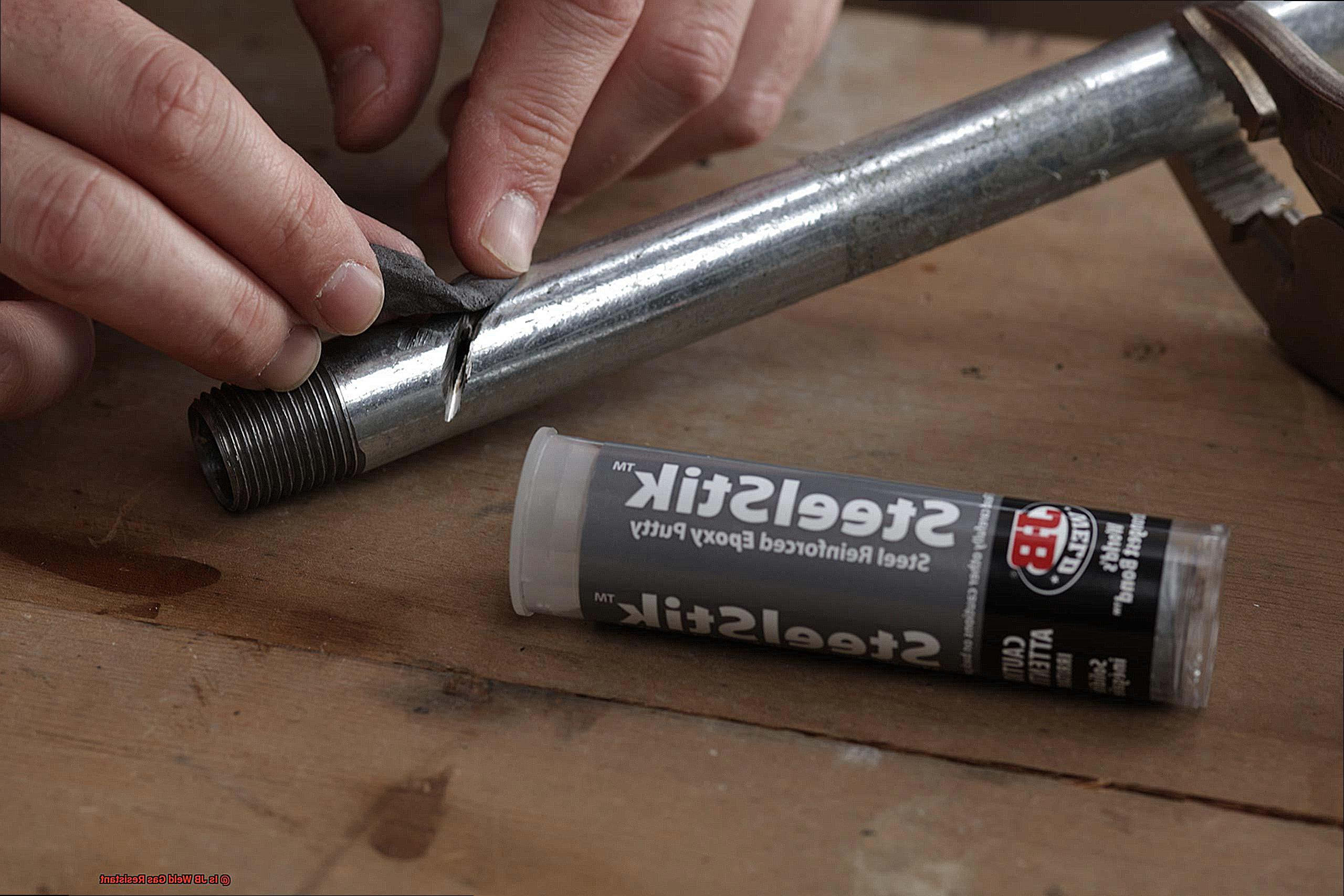
JB Weld’s gas resistance is one of its standout features. It can resist exposure to gasoline, diesel fuel, oil, and other petroleum-based products. This makes it an excellent choice for repairing gas tanks, fuel lines, and other similar components that come into contact with these substances.
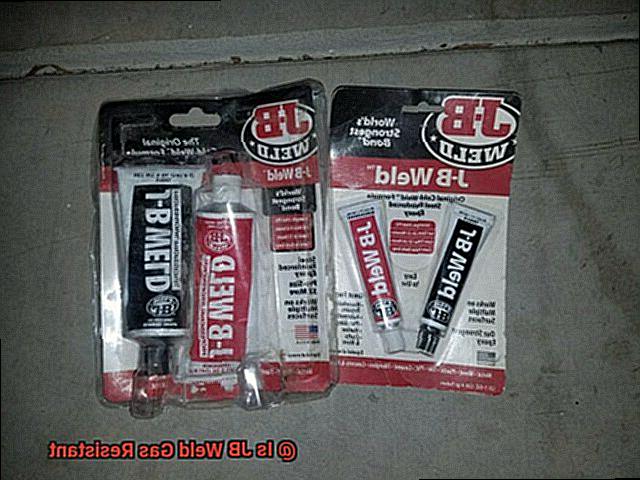
In addition to its gas resistance, JB Weld is incredibly strong and durable with a tensile strength of up to 5020 psi. This means it can handle the pressure and stress associated with gas-related repairs without cracking or breaking. By using JB Weld, you can rest easy knowing that your repairs will be long-lasting and reliable.
Another advantage of using JB Weld is how easy it is to use. The two-part system does require mixing before application, but once mixed, it can be applied with a putty knife or other similar tools. The mixture sets in just 4-6 hours and fully cures in 15-24 hours depending on the temperature and humidity. This quick cure time allows you to get your repairs done efficiently.
JB Weld is also versatile, which is another reason why it’s so popular. It can be used on a variety of surfaces including metal, wood, ceramic, concrete, and more. Having JB Weld in your toolbox means you have a handy tool for all kinds of repairs.
Disadvantages of Using JB Weld for Gas-Related Repairs
If you’re dealing with gas-related repairs, it may be tempting to opt for an easy and quick fix like JB Weld. However, as a seasoned expert in this area, I strongly advise against it. There are several disadvantages to using this product that could compromise your safety and the integrity of the repair.
First and foremost, JB Weld is not designed to withstand the high pressures and temperatures commonly involved in gas-related repairs. Using it could lead to catastrophic consequences like gas leaks and even explosions. Therefore, it’s crucial to use materials that can handle these conditions without fail.
Furthermore, JB Weld is not resistant to certain chemicals that are typically found in gas-related repairs. These chemicals can break down the bond created by JB Weld, which can cause further leaks and potential hazards.
Another disadvantage of using JB Weld is that it may not provide a permanent solution for gas-related repairs. Over time, the bond created by JB Weld may weaken or break down altogether, leading to the need for further repairs.
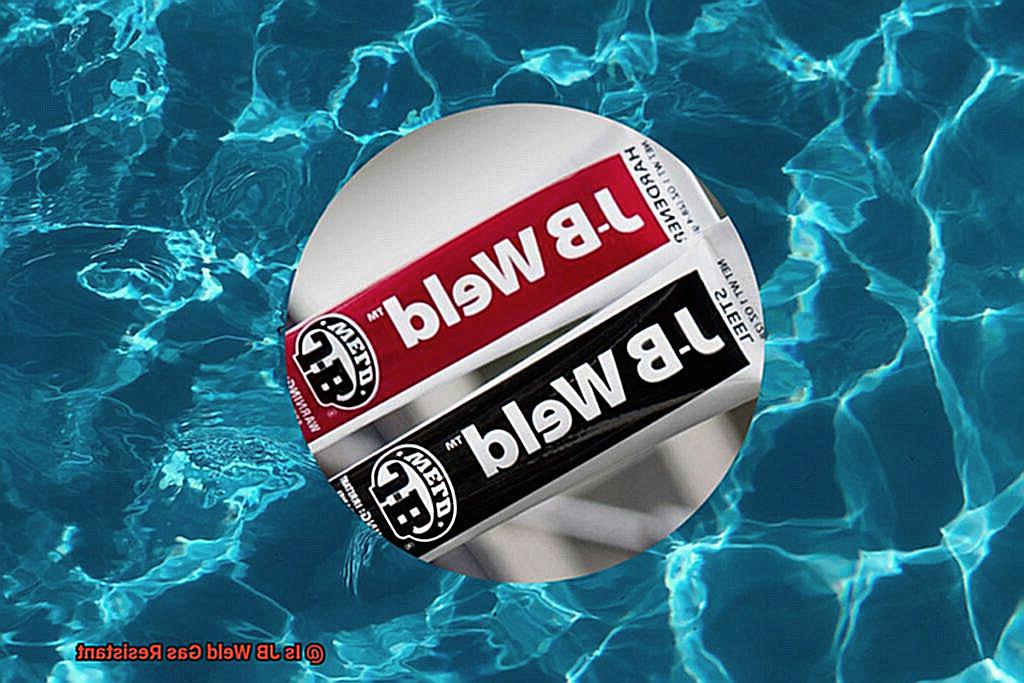
Lastly, using JB Weld for gas-related repairs may not comply with industry standards and regulations. These regulations often require using specific materials or methods for gas-related repairs to ensure safety.
vUNJLzu4-rw” >
Conclusion
In conclusion, JB Weld is more than just a popular and reliable epoxy adhesive; it’s a game-changer when it comes to repairing gas leaks. With its exceptional strength and durability, JB Weld has earned a reputation as the go-to solution for all kinds of damage, including exposure to gasoline, diesel fuel, propane, natural gas, and oil.
Thanks to its unique chemical composition, curing time, heat resistance, pressure resistance, and tensile strength, JB Weld is an excellent choice for those looking for a gas-resistant adhesive solution. But here’s the catch: while JB Weld can withstand most types of gas exposure with ease, alcohol-based fuels like methanol can weaken the bond over time. So be sure to follow the manufacturer’s instructions carefully.
When using JB Weld for gas-related repairs or applications, proper surface preparation and application are crucial to ensure that it can withstand exposure to gas or other chemicals. And while JB Weld may be useful for some types of repairs, it’s not always the safest or most reliable option for all gas-related repairs.
In summary: if you need a dependable and resilient solution for your gas-related repairs that complies with industry standards and regulations – look no further than JB Weld. Just remember to prioritize safety first and use materials specifically designed for these types of repairs.
